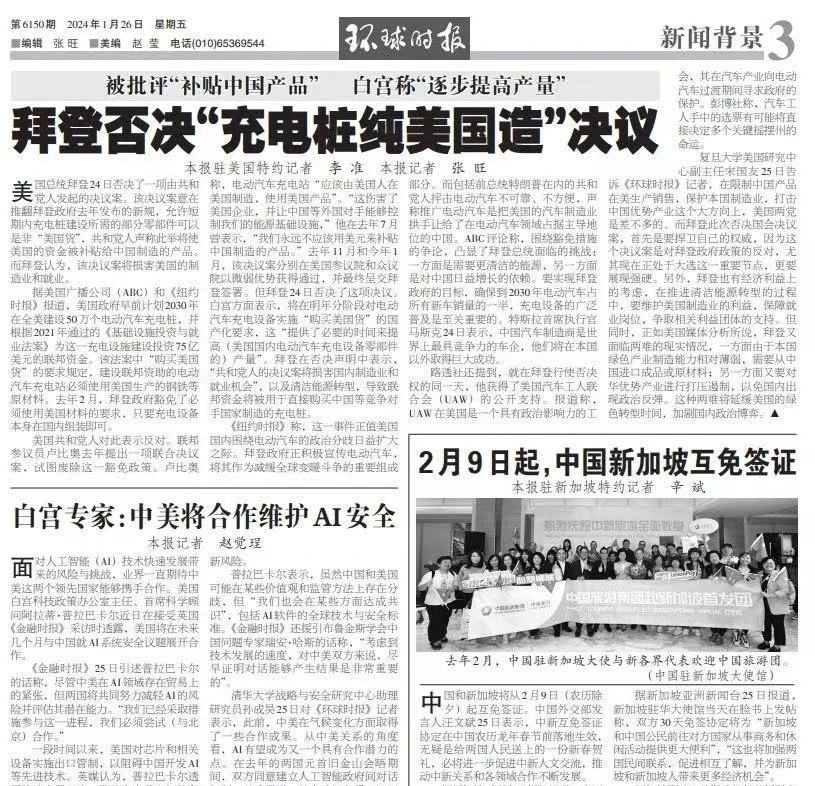US President Biden vetoed a resolution sponsored by Republicans on the 24th. The resolution is intended to overturn new regulations issued by the Biden administration last year, allowing some parts needed for the construction of charging piles to be non-”American” in the short term. Republicans claim that this move will allow U.S. funds to be subsidized to products made in China. product. Biden believes that the resolution will harm U.S. manufacturing and employment.
According to reports from the American Broadcasting Corporation (ABC) and the New York Times, the U.S. government had earlier planned to build 500,000 electric vehicle charging piles across the United States in 2030 and provide this charging base in accordance with the Infrastructure Investment and Jobs Act passed in 2021. $7.5 billion in federal funds were invested in the facility’s construction. The “Buy American” requirement in the bill requires that the construction of federally funded electric vehicle charging stations must use raw materials such as steel produced in the United States. Last February, the Biden administration waived the requirement to use U.S. materials as long as the charging equipment itself was assembled domestically.
U.S. Republicans are opposed to this. Senator Rubio introduced a joint resolution last year seeking to repeal the exemption. Rubio said electric vehicle charging stations “should be made in the United States by Americans, using American products.” “This hurts American businesses and allows foreign adversaries such as China to control our energy infrastructure,” he said in July last year. “We should never use dollars to subsidize products made in China.” Last November and this year In January, the resolution was narrowly passed by the U.S. Senate and House of Representatives, and was finally submitted to Biden for signature. But Biden vetoed this resolution on the 24th. The White House stated that it will implement “Buy American” domestic requirements for electric vehicle charging equipment in phases next year, which “provides the necessary time to increase production (of domestic electric vehicle charging equipment parts in the United States).” In his veto statement, Biden said that “the Republican resolution would harm domestic manufacturing and jobs” and the clean energy transition, resulting in federal funds being used to directly purchase charging piles made in rival countries such as China.
The New York Times stated that this incident comes at a time when political differences around electric vehicles are widening in the United States. The Biden administration is aggressively promoting electric vehicles as an important part of the fight to slow global warming. Republicans, including former President Trump, have criticized electric vehicles as unreliable and inconvenient, claiming that promoting electric vehicles is handing over the U.S. auto manufacturing industry to China, which dominates the field of electric vehicles. ABC commented that the controversy surrounding exemption measures highlights the challenges faced by President Biden: on the one hand, the need for cleaner energy, and on the other hand, the growing dependence on China. To achieve the Biden administration’s goal of ensuring that electric vehicles account for half of all new car sales by 2030, widespread access to charging equipment is critical. Tesla CEO Musk said on the 24th that Chinese automakers are the most competitive automakers in the world and they will achieve great success outside their home country.
Reuters also mentioned that on the same day that Biden exercised his veto power, he received public support from the United Auto Workers (UAW). According to reports, the UAW is a politically influential union in the United States that seeks government protection during the auto industry’s transition to electric vehicles. Bloomberg said that the votes in the hands of auto workers may directly determine the fate of many key swing states.
Song Guoyou, deputy director of the American Studies Center at Fudan University, told the Global Times reporter on the 25th that the two parties in the United States are similar in the general direction of restricting the production and sales of Chinese products in the United States, protecting the country’s manufacturing industry, and cracking down on China’s advantageous industries. When Biden vetoes the congressional resolution this time, he first wants to defend his authority, because this resolution is an opposition to the policies of the Biden administration. Especially now that we are at the important juncture of the general election, he needs to show toughness. In addition, Biden also has economic interests to consider. In the process of promoting the clean energy transition, he must safeguard the interests of the U.S. manufacturing industry, protect jobs, and win the support of relevant interest groups. But at the same time, as US media analysts said, Biden is faced with a dilemma. On the one hand, due to the relatively weak manufacturing capacity of the country’s green industry, it needs to import finished products or raw materials from China; on the other hand, it must suppress and contain China’s advantageous industries. , to avoid domestic political backlash. This dilemma will delay the green transition of the United States and intensify domestic political games.
Susie
Sichuan Green Science & Technology Ltd., Co.
0086 19302815938
Post time: Feb-08-2024





